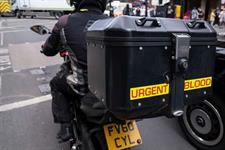A charity that transports blood, medical equipment and samples to NHS establishments made unauthorised payments to its trustees, the Charity Commission has found.
The regulator published its statutory inquiry report into Devon Freewheelers today (19 July), which found the charity had made unauthorised payments to two trustees, including its chief executive.
The inquiry was opened in September after the regulator found “potential irregularities” in its financial accounts for the years ending 31 October 2020 and 31 October 2021, which were filed hundreds of days late.
The investigation found that two of the charity’s trustees, including its current chief executive Russell Roe, were receiving regular payments from Devon Freewheelers for “services to the charity”.
But the regulator said that the charity’s governing document prohibited trustees from being employed or receiving remuneration from it unless specific conditions are met – which they were not.
The regulator found that these were unauthorised payments and a breach of the charity’s governing document, adding that it constituted “misconduct and/or mismanagement”.
The trustees involved have stepped down from the board and the charity is seeking permission from the regulator to continue to employ Roe as its chief executive, a request that the commission said it was considering.
When asked about the payments specifically, Roe said he did not wish to comment further.
The inquiry also found the charity had changed its charitable objects without the regulator’s consent to deliver Covid-19 response services.
The charity provided paid Covid-19 response services from March to July 2020 for the Royal Devon and Exeter NHS Foundation Trust under a service level agreement, the inquiry found.
To deliver these services, the charity hired additional staff and significantly upscaled its operations, which the regulator said fell outside the charity’s declared objects.
The regulator’s report says: “The decisions made by the previous trustees to enter the SLA and amend its charitable objects without the consent of the commission, was misconduct and/or mismanagement in the administration of the charity by the previous trustees.”
The inquiry also found that the delivery of paid services under the SLA “conflicted with the charity’s ethos of delivering its usual blood bike operations free of charge”.
The report says this “created confusion to the public over the charity’s operation and ultimately damaged the charity’s reputation”.
The charity’s previous chief executive set up a private limited company which took over the SLA in August 2020 and the charity returned to offering free services, the regulator said.
Russell Roe, chief executive of Devon Freewheelers, said the sharity viewed the inquiry as an “opportunity to improve”, saying it had “worked with the commission to address all the issues they noted and resolved them to the commission’s satisfaction”.
He said: “As part of their investigation, they were able to confirm that the blood bikes charity “has not charged and does not charge for its services”.
Since the events that triggered the investigation, the charity has submitted two further sets of annual accounts, fully audited, on time and compliant.
“Today, under new management and trustees we are confident that we are operating in line with all legal requirements and best practice going forward,” said Roe.
Amy Spiller, head of investigations at the Charity Commission, said the charity’s trustees “cooperated fully” with the investigation and were using the regulator’s guidance and advice to ensure best practice moving forward.
She said the commission was confident that there was no further role for it at this time and could conclude its inquiry.
Spiller said: “This case demonstrates how important it is for all trustees to know and follow their governing documents, and to operate within their charitable purposes. This is crucial to any well managed charity.
She advised all trustees to ensure that they understand the full range of their duties and responsibilities, saying: “We have guidance to help you on many issues, including filing your accounts on time, recording and managing conflicts of interest and documenting decision-making so that, if required, you can evidence that you are working in the best interests of your charity.”
